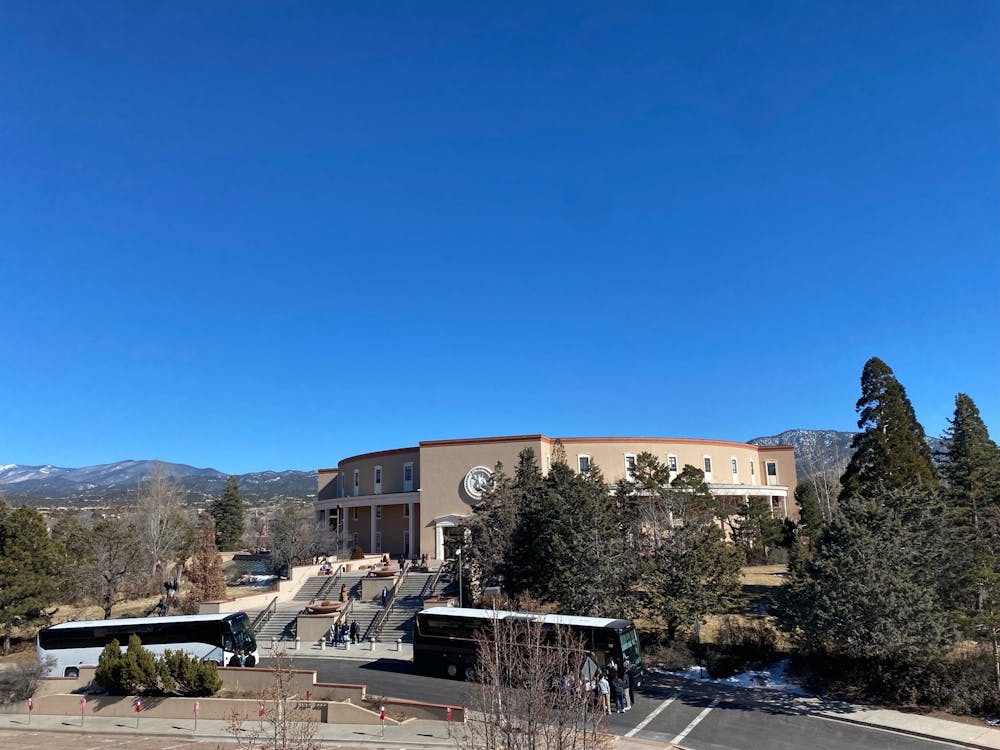The New Mexico State Legislature is currently the only U.S. state legislature to not pay its representatives. It has one of the shortest session lengths and smallest staffs. To modernize the Legislature could mean increasing all of the above, according to a Bureau of Business and Economic Research study.
Last fall, Rose Elizabeth Rohrer, a researcher with BBER at UNM, interviewed 24 of the 112 state representatives and received surveys from 44.4% of the staff to hear their thoughts on the status of the Legislature.
Of the responses, many said they would benefit from at least one half-time, individually assigned staffer, and at most two full-time staffers. 82.9% said they should be paid, and that the current per diem and travel compensation does not cover the costs of the job. 80.7% said that there was not enough time in the session to dedicate the amount of time to legislation that it deserves.
While Rohrer said it was evident during the interviews that representatives from both parties want conversations about modernization, many do not feel there is the time available with the current session length.
“They felt that there's no time to have these conversations and that everything feels so compressed and rushed and difficult that having the tougher conversations sometimes goes by the wayside,” Rohrer said.
Two political science professors at UNM, Michael Rocca and Timothy Krebs, have also studied what modernization would look like via the Thornburg Foundation.
A constitutional amendment would be needed to obtain an increased salary and extended session. The amendment would need to first go through both houses, be signed by the Governor and then passed as a referendum by the people on a ballot. Increases in staffing could be accomplished with a line item on the budget, Rocca said.
For many legislators in New Mexico there comes a point, especially for those who are parents, where they can’t afford to serve anymore due to financial reasons, Rocca said.
“In my interviews with legislators … there is a lot of concern about holding a job and or holding a full time job and being able to be a legislator and have family and have time for themselves and those kinds of things,” Rohrer said.
Increased capacity, in staffing and session length, could influence the quality of policy that is produced, Rocca said.
“There's no doubt that the greater the capacity for a legislature, the more likely they're going to create policies that are probably not only more innovative but are a better match for the unique challenges that that particular state has,” Rocca said.
Get content from The Daily Lobo delivered to your inbox
In situations where policy is blocked by the legislator, modernization could provide more options to create different policies, Krebs said.
“If there's something coming out of the executive branch that the legislature simply does not want. They can block (it) by not acting on it, but it doesn't necessarily mean they're going to have the ability, the capacity to produce an alternative,” Krebs said.
Currently, with the limited capacity of the state legislator, it by nature gives more power to the executive branch, and special interest groups, as they operate year-round to do their work, unlike the legislature, Rocca said.
“They do not have the time and they do not have the resources to push back against lobbying, or they cannot possibly compete with the expertise that our bureaucracy holds. And remember a bureaucracy (is what our) legislature is supposed to regulate,” Rocca said.
Increasing staff could allow representatives to have more support to stay in better contact with their constituents while working on policy, Krebs said.
The implementation of compensation for representatives could also help reduce conflicts of interest between their day jobs and their representative duties.
“You have members of our community who are running banks, who then are on committees during the 60-day session that are meant to regulate banks in the state of New Mexico. That's a serious problem,” Rocca said.
The policy that is produced by the Legislature has a sustainable impact on UNM, as it receives lots of federal funding, specifically considering the Opportunity Scholarship, Rocca said.
“A more modern legislature, a more professionalized legislature could, in many ways, help UNM students get represented, fairly and adequately dealing with the sorts of policies that literally affect their pocketbook and not to mention what they'll be doing after they graduate,” Rocca said.
Maddie Pukite is the Editor-in-Cheif at the Daily Lobo. They can be contacted at editorincheif@dailylobo.comor on Twitter @maddogpukite






